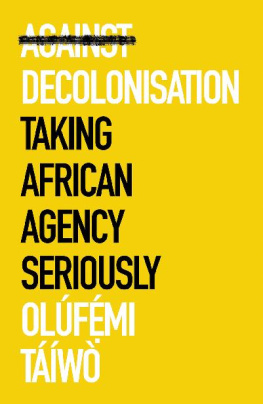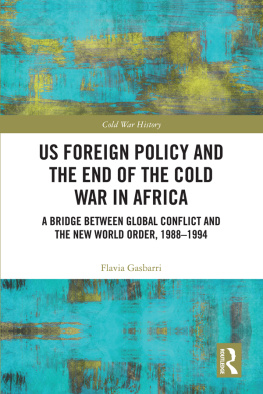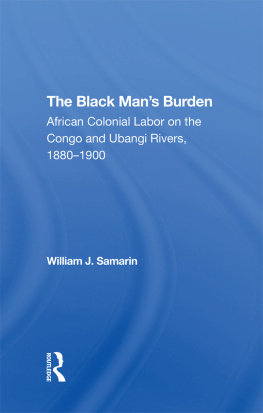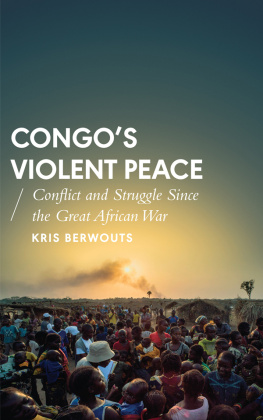
America, the UN and Decolonisation
This book examines the role of the UN in conflict resolution in Africa in the 1960s and its relation to the Cold War.
Focusing on the Congo, this book shows how the preservation of the existing economic and social order in the Congo was a key element in the decolonisation process and the fighting of the Cold War. It links the international aspects of British, Belgian, Angolan and Central African Federation involvement with the roles of the US and UN in order to understand how supplies to and profits from the Congo were producing growing African problems. This large Central African country played a vital, if not fully understood, role in the Cold War and proved to be a fascinating example of complex African problems of decolonisation interacting with international forces, in ways that revealed a great deal about the problems inherent in colonialism and its end.
This book will be of much interest to students of US foreign policy, the UN, Cold War history and international history in general.
John Kent is Reader in International Relations at the London School of Economics.
Series: LSE international studies
Series Editors: John Kent, Christopher Coker, Fred Halliday, Dominic Lieven and Karen Smith
The International Studies series is based on the LSEs oldest research centre and like the LSE itself was established to promote interdisciplinary studies. The Centre for International Studies facilitates research into many different aspects of the international community and produces interdisciplinary research into the international system as it experiences the forces of globalisation. As the capacity of domestic change to produce global consequences increases, so does the need to explore areas which cannot be confined within a single discipline or area of study. The series hopes to focus on the impact of cultural changes on foreign relations, the role of strategy and foreign policy and the impact of international law and human rights on global politics. It is intended to cover all aspects of foreign policy, including: the historical and contemporary forces of empire and imperialism; the importance of domestic links to the international roles of states and non-state actors, particularly in Europe; and the relationship between development studies, international political economy and regional actors on a comparative basis; but is happy to include any aspect of the international with an interdisciplinary aspect.
American Policy Toward Israel
The power and limits of beliefs
Michael Thomas
The Warrior Ethos
Military culture and the war on terror
Christopher Coker
The New American Way of War
Military culture and the political utility of force
Benjamin Buley
Ethics and War in the 21st Century
Christopher Coker
Armed Groups and the Balance of Power
The international relations of terrorists, warlords and insurgents
Anthony Vinci
The Future of Biological Disarmament
Strengthening the treaty ban on weapons
Nicholas A.Sims
The Character of War in the 21st Century
Paradoxes, contradictions and continuities
Edited by Caroline Holmqvist-Jonster and Christopher Coker
America, the UN and Decolonisation
Cold War conflict in the Congo
John Kent
America, the UN and Decolonisation
Cold War conflict in the Congo
John Kent

LONDON AND NEW YORK
First published 2010
by Routledge
2 Park Square, Milton Park, Abingdon, Oxon OX14 4RN
Simultaneously published in the USA and Canada
by Routledge
270 Madison Avenue, New York, NY 10016
Routledge is an imprint of the Taylor & Francis Group, an informa business
This edition published in the Taylor & Francis e-Library, 2009.
To purchase your own copy of this or any of Taylor & Francis or Routledges collection of thousands of eBooks please go to www.eBookstore.tandf.co.uk.
2010 John Kent
All rights reserved. No part of this book may be reprinted or reproduced or
utilised in any form or by any electronic, mechanical, or other means, now
known or hereafter invented, including photocopying and recording, or in
any information storage or retrieval system, without permission in writing
from the publishers.
British Library Cataloguing in Publication Data
A catalogue record for this book is available from the British Library
Library of Congress Cataloging in Publication Data
A catalog record for this book has been requested
ISBN 0-203-85192-7 Master e-book ISBN
ISBN10:0-415-46414-5 (hbk)
ISBN10:0-203-85192-7 (ebk)
ISBN13:978-0-415-46414-7 (hbk)
ISBN13:978-0-203-85192-0 (ebk)
Contents
Acknowledgements
Thanks to all those who provided help and friendly advice at US archives and the Kennedy library in particular for the declassification of the Cleveland papers and for being in Boston.
Thanks also to my wife Brenda for putting up with so many papers littering the house. For her they were far worse than mice or spiders.
And, finally, thanks to Routledge for their patience and for providing a proper copy editor, unlike some academic publishers who rely on house stylists.

Figure 1 Congo in 1961 (source: John F.Kennedy Library NSF Country Series Congo).

Figure 2 Congo in 1962 (source: John F.Kennedy Library NSF Brubeck Series).

Figure 3 Congo in June 1963 (source: John F.Kennedy Library NSF Country Series Congo).

Figure 4 Congo at the start of 1967 (source: US National Archives and Records Administration RG 59 SNF 196466 POL).
Introduction
The Congo should be at the centre of the debates on the international and Cold War influences on African decolonisation despite being dismissed as a mere sideshow by those focusing on the nationalist pressures experienced by the French and British empires. Yet this large Central African country played a vital, if not fully understood, role in the Cold War and proved to be a fascinating example of complex African problems of decolonisation interacting with international forces. These forces were certainly not confined to the politics of Brussels and the influence there of Belgian settlers, nor to the United Nations and the United States. They also included international capitalism, particularly that dominated by European entrepreneurs, in ways that revealed a great deal about the problems inherent in colonialism and its end.











